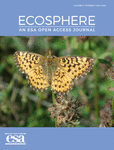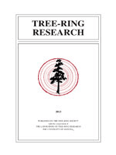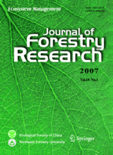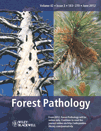
TREES-STRUCTURE AND FUNCTION
Scope & Guideline
Illuminating the vital role of trees in our ecosystem.
Introduction
Aims and Scopes
- Tree Physiology and Biochemistry:
Research exploring the physiological processes in trees, including photosynthesis, transpiration, and nutrient uptake, often under varying environmental conditions. - Wood Anatomy and Structural Function:
Studies focusing on the anatomical characteristics of wood, including vessel structure, density, and their implications for tree function and resilience against stressors. - Ecophysiology and Climate Interactions:
Investigations into how trees respond to climatic factors such as drought, temperature, and soil moisture, emphasizing physiological adaptations and growth patterns. - Genetic Diversity and Conservation:
Research on genetic variability among tree populations, including implications for conservation, breeding programs, and ecosystem resilience. - Urban Forestry and Ecosystem Services:
Studies addressing the role of trees in urban environments, focusing on their contributions to ecosystem services, including air quality improvement, shade provision, and biodiversity support. - Restoration Ecology and Management Practices:
Research aimed at understanding and improving restoration practices for degraded forests, including the role of tree species selection and management strategies.
Trending and Emerging
- Drought Resilience Mechanisms:
Recent publications increasingly focus on understanding the physiological and anatomical adaptations of trees to drought conditions, highlighting the importance of resilience in the face of climate change. - Urban Tree Functionality and Ecosystem Services:
There is a growing trend towards research on the roles of urban trees in enhancing ecosystem services, addressing urban heat islands, and improving air quality, reflecting the increasing importance of urban forestry. - Advanced Biotechnological Approaches:
Emerging studies utilize advanced biotechnological techniques, such as transcriptomics and metabolomics, to explore tree responses to environmental stressors and improve tree breeding and conservation efforts. - Climate Change Impact Assessments:
A marked increase in research assessing the impacts of climate change on tree growth, distribution, and health indicates a trend towards understanding long-term ecological consequences. - Microbial Interactions and Soil Health:
There is an emerging focus on the interactions between trees and soil microbiomes, particularly how these relationships affect tree health and ecosystem functioning.
Declining or Waning
- Traditional Silviculture Practices:
There is a noticeable decrease in studies focusing solely on traditional silvicultural practices, as the journal shifts towards integrating ecological and physiological research with management strategies. - Invasive Species Impact Studies:
Research specifically addressing the impacts of invasive species on forest dynamics has become less frequent, indicating a potential waning interest in this area in favor of broader ecological interactions. - Conventional Tree Growth Models:
The reliance on conventional tree growth models is diminishing as the field moves towards more integrative and complex modeling approaches that incorporate physiological and environmental variables.
Similar Journals

BALTIC FORESTRY
Unveiling Insights for Sustainable Forest FuturesBALTIC FORESTRY, published by the INST FORESTRY LRCAF in Lithuania, is a prominent academic journal that serves as a platform for disseminating cutting-edge research in the field of forestry. With an ISSN of 1392-1355, this journal is dedicated to advancing knowledge on sustainable forest management, ecological impacts, and resource conservation, among other vital topics. As of 2023, it has been categorized in the Q3 quartile for forestry in Scopus, indicating its solid reputation among peer-reviewed publications, ranking #95 out of 174 in the realm of Agricultural and Biological Sciences. BALTIC FORESTRY features contributions from researchers across the globe and encourages innovative approaches to solving contemporary challenges in forestry, making it an essential resource for professionals, scholars, and students alike. Although it operates under subscription-based access options, the journal's commitment to fostering academic discourse is unwavering, aiming to bridge the gap between theory and practice in forest science.

Ecosphere
Advancing ecological understanding for a sustainable future.Ecosphere is a leading open-access journal published by WILEY, dedicated to advancing research in the fields of ecology, evolution, behavior, and systematics. Established in 2010 and headquartered in the United States, this innovative journal provides a platform for the exchange of cutting-edge scientific knowledge and discovery, fulfilling its mission to enhance our understanding of ecological systems and their interactions. With a prestigious impact factor reflecting its commitment to high-quality research, Ecosphere is ranked Q1 in both Ecology and Ecology, Evolution, Behavior, and Systematics for 2023, further solidifying its prominence in the scientific community. The journal's scope includes a wide array of topics related to environmental science, making it an essential resource for researchers, professionals, and students aiming to stay at the forefront of ecological research. It offers comprehensive open access options, ensuring that groundbreaking findings are readily available to a global audience, thus fostering collaboration and innovation in the field.

Austrian Journal of Forest Science
Advancing sustainable forestry through innovative research.Austrian Journal of Forest Science, published by OSTERREICHISCHER AGRARVERLAG, is a distinguished peer-reviewed journal dedicated to advancing knowledge in the fields of forestry and ecological science. With an ISSN of 0379-5292 and an E-ISSN of 0375-524X, this journal serves as a vital platform for researchers, professionals, and students alike, aiming to disseminate innovative research findings, methodologies, and case studies pertinent to forest conservation, management, and policy. Situated in Austria, its diverse scope encompasses critical topics within ecology, evolution, and biodiversity, evidenced by its competitive quartile rankings in 2023, placing it in Q2 for Forestry and Q3 in other related fields. The journal is committed to fostering a deeper understanding of forest ecosystems, making it an essential resource for anyone invested in sustainable forestry practices and environmental policy.

Tree-Ring Research
Uncovering Nature's Secrets Through Tree-Ring ScienceTree-Ring Research is a prestigious journal dedicated to advancing the interdisciplinary study of tree-ring science, encompassing atmospheric science, geology, paleontology, and forestry. Published by the TREE-RING SOC in the United States, this journal serves as a vital platform for researchers and professionals seeking to share innovative findings and develop collaborative methodologies in dendrochronology and its applications. With a commendable standing across multiple categories, including Q2 in Forestry and Q3 rankings in Atmospheric Science, Geology, and Paleontology for 2023, Tree-Ring Research holds an important position within the academic community. Researchers are encouraged to access recent studies and contribute their findings, fostering a rich dialogue that illuminates the complexities of environmental change and forest ecosystems. The journal's comprehensive scope and commitment to quality make it an essential resource for those engaged in understanding the critical role trees play in our planet’s ecological health and history.

ANNALS OF FOREST SCIENCE
Bridging Research and Practice in Forest ConservationANNALS OF FOREST SCIENCE, published by Springer France, stands at the forefront of ecological research, contributing significantly to both the fields of Ecology and Forestry, as evidenced by its prestigious Q1 ranking in both categories for 2023. Since its inception in 1999, this journal has become an essential resource for academics, practitioners, and students who are eager to explore the complexities of forest ecosystems and their interactions with global environmental changes. With an ISSN of 1286-4560 and E-ISSN 1297-966X, it disseminates cutting-edge research and critical reviews that enhance our understanding of forest science. Although it does not offer open access, the journal continues to be a pivotal platform for presenting innovative scientific findings that address the pressing challenges of forest management and conservation. Its significant impact factor reflects the high-quality contributions that have made a lasting mark on the discipline.

Ecosistemas
Bridging knowledge and action for ecological resilience.Ecosistemas is a prominent Open Access journal published by the ASOCIACION ESPANOLA ECOLOGIA TERRESTRE, specializing in the field of ecology. Since its inception in 2001, it has dedicated itself to advancing ecological knowledge and research, fostering an inclusive platform for the dissemination of cutting-edge studies that span ecological interactions, sustainability, and biodiversity. The journal, based in Spain, has established its reputation with notable rankings such as Q3 in the field of Ecology and Q4 in Ecology, Evolution, Behavior, and Systematics, reflecting its commitment to quality research. With a Scopus Ranks position placing it in the 40th and 37th percentiles for its categories, Ecosistemas is integral to the academic community, serving researchers, professionals, and students alike. It provides a vital resource for those seeking to understand ecological dynamics and environmental challenges, facilitating open access to important findings and discussions that shape the future of our ecosystems.

JOURNAL OF FORESTRY RESEARCH
Driving sustainable solutions through rigorous research.JOURNAL OF FORESTRY RESEARCH, published by Northeast Forestry University in China, stands as a pivotal platform for advancing the field of forestry science. With an ISSN of 1007-662X and an E-ISSN of 1993-0607, this esteemed journal has maintained its commitment to disseminating high-quality research since its inception in 1997, converging into a recognized authority through the years. Currently boasting a Q1 ranking in the Forestry category for 2023, it ranks 18th out of 174 journals in its field on Scopus, highlighting its vital role in shaping contemporary forestry studies. The journal focuses on a broad spectrum of topics pertinent to forestry, including sustainable forest management, ecology, and conservation efforts, making it an indispensable resource for researchers, professionals, and students alike. Although it is not an open-access publication, the insights shared within its pages promise to contribute significantly to the advancement of knowledge and practices in forestry. The journal's significant impact and relevance are underscored by its operations from Harbin, People's Republic of China, where it continues to foster scholarly communication in the world of forestry research.

NEW PHYTOLOGIST
Pioneering Research to Sustain Our FutureNEW PHYTOLOGIST is a premier international journal published by WILEY, focusing on the field of plant science and physiology. Operating since 1902, this esteemed journal has established itself as a vital resource for researchers and professionals alike, offering cutting-edge research and insights into the complex workings of plants and their physiological processes. With an impressive impact factor and recognized in the top quartile (Q1) of both the physiology and plant science categories, it ranks #8 and #9 respectively in their fields, placing it within the top 2% of journals. NEW PHYTOLOGIST is not only essential for enhancing the understanding of plant biology but also for addressing global challenges such as food security and environmental sustainability. Although it does not currently offer open access, the journal remains committed to disseminating knowledge to a wide audience through institutional subscriptions and partnerships. This journal continues to drive advancements in plant science into the future, making it an invaluable asset for students, researchers, and industry professionals.

Forest Ecosystems
Connecting research to conservation efforts.Forest Ecosystems is a prestigious open access journal published by KEAI PUBLISHING LTD, dedicated to advancing knowledge in the fields of forestry, ecology, and conservation. Established in 2014 and located in Beijing, China, this journal has rapidly gained prominence, achieving Q1 status in multiple categories, including Ecology, Evolution, Behavior and Systematics, and Forestry in 2023. With an impressive rank of 19 out of 174 in the Scopus category of Agricultural and Biological Sciences - Forestry, it stands in the 89th percentile, reflecting its influential contributions to the field. The journal fosters scholarly discourse and disseminates innovative research aimed at understanding forest ecosystems and their vital role in our environment. Offering a robust platform for researchers, professionals, and students, Forest Ecosystems ensures accessibility through its open access format, enabling a wider audience to engage with and benefit from cutting-edge research dedicated to the stewardship of forest resources.

FOREST PATHOLOGY
Exploring the Dynamics of Forest HealthFOREST PATHOLOGY is a premier journal published by Wiley that focuses on the intricate relationships between trees, pathogens, and forest health. With an ISSN of 1437-4781 and an E-ISSN of 1439-0329, this British journal has garnered an impressive reputation in the fields of Ecology and Forestry, achieving a Q2 Quartile ranking in both categories as of 2023. The journal invites researchers and professionals to explore cutting-edge studies and case reports that delve into forest pathology, contributing to the understanding of disease dynamics and management in forest ecosystems. Currently indexed in Scopus, it ranks 61st out of 174 in the Forestry category and 214th out of 461 in Ecology, reflecting its impact and relevance in advancing the field. Access options are available to cater to a wide audience, emphasizing the journal's commitment to disseminating vital knowledge that enhances forest management practices and ecological resilience. FOREST PATHOLOGY stands as an essential resource for those dedicated to the health and sustainability of forest ecosystems.